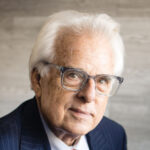Oh good grief. Peter Singer has embraced Aubrey de Gray’s quest to defeat human aging. For those who don’t know, de Gray — who looks like a long-lost member of ZZ Top — believes that his research is so important that it should be funded ahead of providing healthcare for destitute Africans. Indeed, I saw him give a wild-eyed speech in which he explicitly compared under funding his work to a terrorist blowing up a car.
Singer first questions whether depriving people of needed healthcare now in the (vain, in both senses of the word, in my view) quest for radical life extension, is ethical. From, ”Should We Live to 1000?”:
. . . we still need to pose the ethical question: Are we being selfish in seeking to extend our lives so dramatically? And, if we succeed, will the outcome be good for some but unfair to others? People in rich countries already can expect to live about 30 years longer than people in the poorest countries. If we discover how to slow aging, we might have a world in which the poor majority must face death at a time when members of the rich minority are only one-tenth of the way through their expected lifespans.
That disparity is one reason to believe that overcoming aging will increase the stock of injustice in the world. Another is that if people continue to be born, while others do not die, the planet’s population will increase at an even faster rate than it is now, which will likewise make life for some much worse than it would have been otherwise. Whether we can overcome these objections depends on our degree of optimism about future technological and economic advances.
Not selfish, foolish. And can we can it with the equality of results nonsense? We should help today’s suffering poor — rather than throw money down the de Gray rat hole — because they are today’s suffering poor. Destitute kids in Africa need protection from malaria today, not an extra fifty years of life in the tomorrow that never comes.
After posing the supposedly tough questions, Singer votes for immortality:
De Grey’s response to the first objection is that, while anti-aging treatment may be expensive initially, the price is likely to drop, as it has for so many other innovations, from computers to the drugs that prevent the development of AIDS. If the world can continue to develop economically and technologically, people will become wealthier, and, in the long run, anti-aging treatment will benefit everyone. So why not get started and make it a priority now?
As for the second objection, contrary to what most people assume, success in overcoming aging could itself give us breathing space to find solutions to the population problem, because it would also delay or eliminate menopause, enabling women to have their first children much later than they can now. If economic development continues, fertility rates in developing countries will fall, as they have in developed countries. In the end, technology, too, may help to overcome the population objection, by providing new sources of energy that do not increase our carbon footprint.
Talk about convoluted reasoning.
Singer concludes with a call for better funding for de Gray’s work, in other words, he embraces a bad present utilitarian outcome to tilt at windmills.
I don’t know the depth of Singer’s heart, but I suspect his swoon for de Gray has much to do with his atheism. After all, for the utter materialist, there is no hope in the end. Only nothingness.
Author Profile

Latest entries
- BlogJanuary 27, 2015Ready or Not: Here Comes 2015 in Bioethics!
- BlogOctober 20, 2014A Case of Surrogacy’s Gordian Knot
 BlogAugust 19, 2014Transhumanism’s Eugenic Authoritarianism
BlogAugust 19, 2014Transhumanism’s Eugenic Authoritarianism- BlogAugust 13, 2014Suicide Cult Pushes Home Made Suicide Kits

